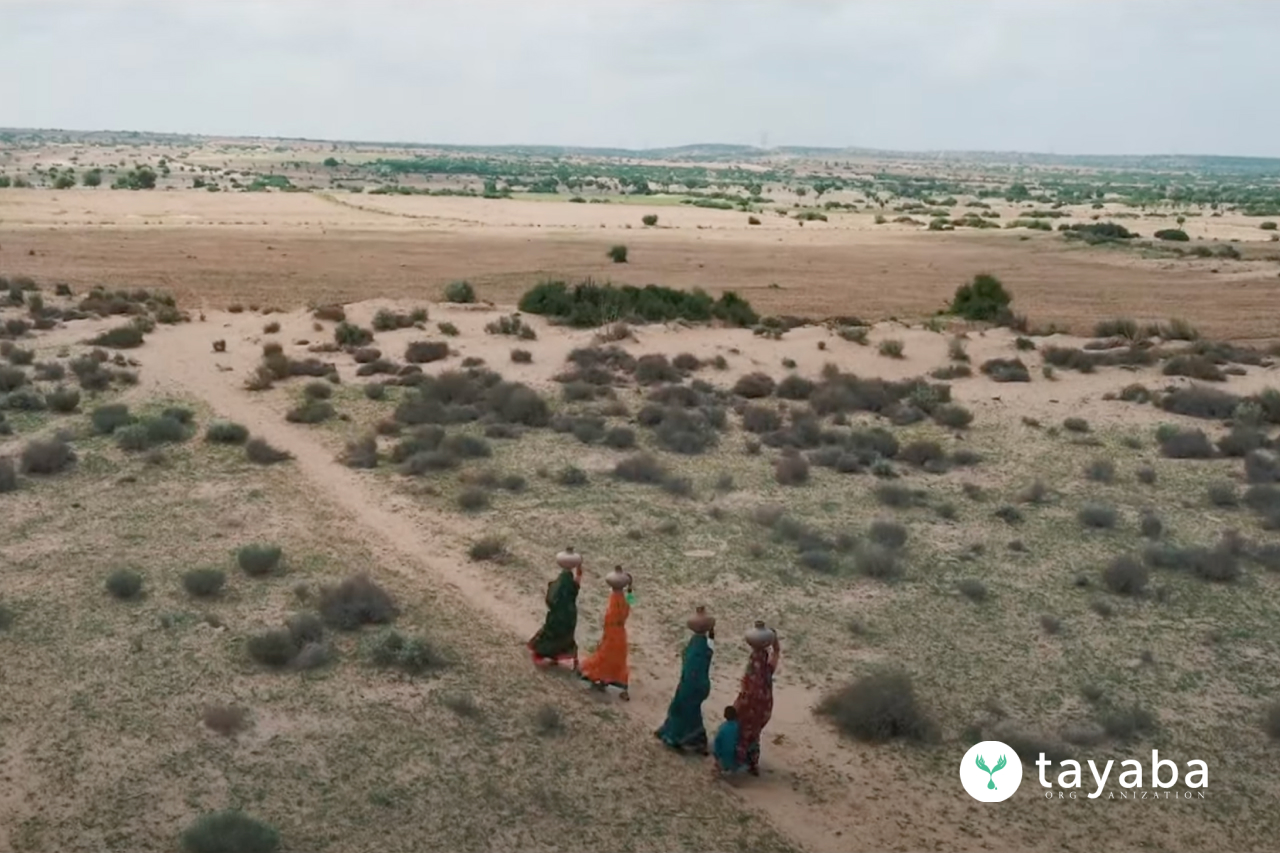Blogs and Articles
Thirsty Herds:
The Fight for Survival in Pakistan’s Hottest City

Photo by Tayaba Organisation – All Rights Reserved
In the vast barren lands under the scorching heat of Jacobabad, where experts have described the climate as “hotter than a human body can handle,” with average temperatures exceeding 50 degrees, stands Chaman Begum, a cattle herder and a woman with nerves of steel (Amnesty International, 2021). However, as she strolls down the harsh paths of her village and gazes at her cattle, even a woman of her courage appears lost and hopeless. She keeps murmuring thoughts that send a shiver down her spine:
“What if my herd remains dehydrated? What if this water problem remains unsolved? They are our bread and butter. If they die, we die.”

Photo by Tayaba Organisation – All Rights Reserved
The people of Jacobabad are heavily dependent on livestock and agriculture for their income. However, the Sindh Drought Need-Based Assessment has revealed that the current drought has adversely affected the livestock population. On average, the residents require 13 liters of drinking water per animal and about 40 liters for washing and cleaning them (Phansalkar, 2007).
However, is there enough water available to meet these needs?
Unfortunately, it is not even near the required threshold. On the contrary, 89% of livestock holders reported a lack of drinking water for their animals, and 25% of them reported cattle deaths in the past six months, with the highest rate of 60% in Thatta.

Source – Reuters
Research shows that in one of the hottest cities in the world—Jacobabad—people have had no access to water for over three decades (Dawn 2023). With the little water they have, they say with grief,
“We prefer our cattle to have clean drinking water first because our livelihood depends on them.”
It is a difficult choice, and in her current situation, Chaman Begum thinks and asks, “How would children eat if the cattle die?” (Clark & Khan, 2022).

Photo by Tayaba Organisation – All Rights Reserved
Worse still, this is not just an isolated case of Chaman Begum; it reflects the plight of more than 35 million people in Pakistan engaged in livestock production (Rehman et al., 2017).
In Jacobabad, where the struggle for water is a daily battle, Chaman Begum’s fears are not unfounded. Her day starts at 6:00 am and ends at sundown. Despite being situated in the resource-rich Indus Basin, extensive canal irrigation has disrupted the natural groundwater balance, leaving the land parched and salty. Less than 10% of the total water supply schemes in Jacobabad function, forcing Chaman Begum and her neighbors to rely on limited and unsafe water sources (Shahab et al., 2018). Her cattle are moved into makeshift pools formed from agricultural runoff. These unhygienic water sources expose them to diseases, deteriorating their health and, in turn, the livelihood of their entire family (Amnesty International, 2021). For Chaman Begum, the survival of her cattle is a matter of life and death, underscoring the desperate need for a sustainable solution.

Source: UN Water
The unforgiving heat, daily struggle for water, and the worsening condition of her cattle have begun to shatter the iron lady’s will. Upon seeing Chaman Begum sitting beside her fellow cattle herder, watching her cattle weak and dehydrated, aid worker Liza Khan expressed her thoughts on the community’s miserable conditions and said,
“It feels like no one sees them, no one cares about them” (Reuters, 2022).
Is this the reality? Do we not care about our fellow beings who desperately crave every drop of such a basic resource? Or do we care but lack the infrastructure to support them? What solutions can help them? When do we start taking action? What we’re looking at is the whole ecosystem, where the dehydration of one crumbles down the whole system. Let’s start small but save big! Let’s H2O (Help-2-Others).

Photo by Tayaba Organisation – All Rights Reserved

We would love to hear your thoughts on how you envision transforming the existing situation to provide basic resources like water to every block of society. Share your insights on how you envision an equitable future with improved access to clean water for all. Join the conversation by emailing us at h2o@tayaba.org
Written By:
Hassam Tahir, Content Associate
Noor Syed, Content Associate
Yumna Waseem, Content Associate
Zoha Waqas, Communications and Research Associate
Graphics By:
Abdul Basit, Graphics and Digital Media Specialist
The opinions in this article are research-based which do not necessarily reflect the views and policies of the Tayaba Organisation.
Published on 20th June, 2024
